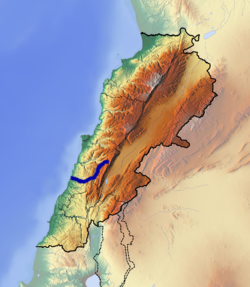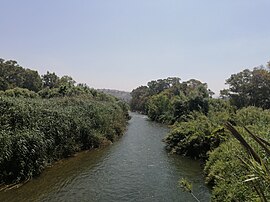The Awali (Arabic: نهر الأولي / ALA-LC: Nahr al-Awalī, ancient Bostrenus / Bostrenos)[1][2] is a perennial river flowing in Southern Lebanon.[3] In ancient times it was known as Asclepius River. The 48 kilometres (30 mi) long Awali originates from the Barouk mountain at a height of 1,492 metres (4,895 ft) and the Niha mountain.
| Awali | |
|---|---|
 | |
 | |
| Location | |
| Country | Lebanon |
| Physical characteristics | |
| Source | |
| • location | Barouk and Niha mountains, Lebanon |
| Mouth | |
• location | the Mediterranean |
| Length | 48 km (30 mi) |
| Basin size | 294 km2 (114 sq mi) |
| Discharge | |
| • average | 10.1625 m3/s (358.89 cu ft/s) |
 | |

The Awali is supplemented by two tributaries, the Barouk and Aaray rivers. The Awali is also known as the Bisri river in its upper section; it flows through the western face of Mount Lebanon and into the Mediterranean. The Awali river has a discharge of 10.1625 m3/s (358.89 cu ft/s), it forms a watershed that has an area of about 294 km2 (114 sq mi).[4] The river flows into Joun Lake, which is part of the Bisri Dam project to improve the supply of fresh water to the region.[5][6] A large portion of the Bisri Dam project funding, from the World Bank, was cancelled by the World Bank in September 2020.[7]
References
edit- ^ Renan, Ernest (1864). Mission de Phénicie dirigée par Ernest Renan: Texte (in French). Impr. impériale. p. 506.
- ^ Lipiński, Edward (1992). Dictionnaire de la civilisation phénicienne et punique (in French). Brepols. p. 77. ISBN 978-2-503-50033-1.
- ^ Lebanese Ministry of Environment (2008). Lebanon State of the Environment Report (PDF). Beirut: Ministry of Environment. Archived from the original (PDF) on 2011-07-21. Retrieved 2010-08-03.
- ^ Arab Resource Development (2003). INTEGRATED WATER RESOURCES MANAGEMENT IN CAMP AREA WITH DEMONSTRATIONS IN DAMOUR, SARAFAND AND NAQOURA MUNICIPALITIES (PDF). Beirut: Ministry of Environment. p. 55. Retrieved 2010-08-03.
- ^ "Greater Beirut Water Supply Augmentation Project: Environment and Social Impact Assessment" (PDF).
- ^ Ray, Kirshen and Vogel, Patrick A., Paul H., and Richard M. (2010). "Integrated Optimization of Dual Quality Water and Wastewater System". Journal of Water Resources Planning and Management. 136: 11 – via ascelibrary.
{{cite journal}}: CS1 maint: multiple names: authors list (link) - ^ "Q&A: Bisri Dam Project Cancelation". World Bank. Retrieved 2021-02-09.